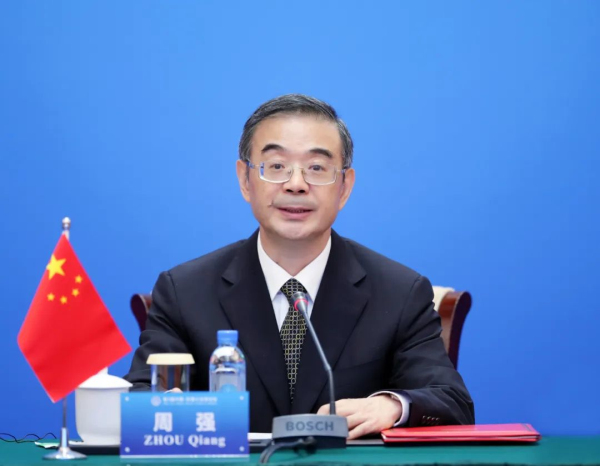Zhou Qiang delivers keynote speech at the 3rd China-ASEAN Justice Forum

Zhou Qiang, chief justice and president of the Supreme People's Court (SPC) of China, delivers a keynote speech at the third China-ASEAN Justice Forum, July 20, 2022. [Photo/ court.gov.cn]
Zhou Qiang, president of the Supreme People's Court (SPC) of China, pledged to strengthen judicial cooperation with member states of the Association of Southeast Asian Nations (ASEAN), in a bid to jointly build a prosperous, green, digital, inclusive and peaceful Silk Road, serve the building of a closer China-ASEAN community with a shared future and the 21st Century Maritime Silk Road, and contribute to peace, stability, prosperity and development of the region and the world. He made the remarks while delivering a keynote speech at the third China-ASEAN Justice Forum on July 20,
Zhou said the Belt and Road Initiative (BRI) proposed by China has been well-received and supported by the international community, and has shown strong resilience and vitality through its projects. ASEAN is an important partner in the BRI cooperation, and Chinese courts have carried out judicial exchanges with and assistance to courts in ASEAN countries at multiple levels and in various fields, contributed to the construction of a harmonious and orderly rule-of-law environment for economy, trade and investment in the region, and yielded positive results in serving high-quality Belt and Road cooperation, he said.
Zhou elaborated on the measures taken and achievements made by Chinese courts in serving high-quality development along the Belt and Road. Efforts were made by Chinese courts to meet the new demands arising from the implementation of the Regional Comprehensive Economic Partnership (RCEP) by formulating a series of judicial interpretations and policies to further optimize the business environment and expand opening-up, according to Zhou. They protected the ecological environment with the best institutional arrangements and the strictest rule of law, pioneered three sets of regulations for online litigation, mediation and operation for courts and advanced blockchain application in judicial work for a more regulated and healthy development of the digital economy, he said. Courts in China also strengthened exchanges with judicial institutions in other countries and regions and promoted a just and equitable international order by fully leveraging the role of judiciary in resolving international conflicts and disputes, he added.
Zhou hoped to fully deepen judicial cooperation with attending parties for the prosperity and development of the region and the world from the following perspectives:
Adopt equal protection in accordance with the law and jointly build "a prosperous Silk Road". Chinese courts are willing to work with courts in ASEAN member states to promote the coordination and unification of regional trade laws and regulations for an efficient implementation of the RCEP and sustainable development of the Belt and Road.
Pursue sustainable development and jointly build "a green Silk Road". Chinese courts are ready to jointly implement the United Nations Framework Convention on Climate Change and the Paris Agreement, and establish a long-term international cooperation mechanism among the environmental judiciary, aiming for a fair and win-win regional and global environmental governance system.
Respond to the needs of sci-tech development and jointly build "a digital Silk Road". Chinese courts are ready to deepen cooperation in digital fields and promote the establishment of a mutually beneficial, open and transparent international rules and standards system for e-commerce so as to foster an open, fair, just and non-discriminatory environment for sci-tech development and serve the high-quality development of the digital economy.
Embrace extensive consultation, joint contribution and shared benefits and jointly build "an inclusive Silk Road". Chinese courts are ready to deepen judicial exchanges with their counterparts in ASEAN countries, improve mechanisms such as international judicial assistance, case exchanges and sharing, exchanges of law application and cooperation in training of judges, strengthen rule-of-law cooperation in epidemic prevention and control, and strive for a more open, inclusive, shared, balanced and win-win economic globalization.
Adhere to true multilateralism and jointly build "a peaceful Silk Road". Chinese courts are ready to strengthen communication and cooperation with counterparts in ASEAN countries based on a common, comprehensive, cooperative and sustainable security mindset, advance inclusive, modern, comprehensive and mutually beneficial China-ASEAN economic and trade relations, promote more balanced bilateral trade, jointly crack down on trans-border crimes, join hands to respond to security challenges, and safeguard regional integrated development and people's wellbeing.







